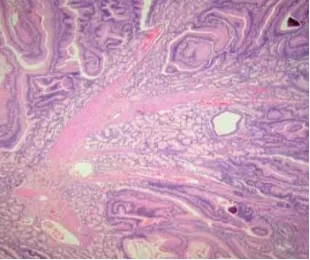The study found that patients with melasma polyps syndrome may have stomach cancer

The study found that patients with melasma polyps syndrome may have stomach cancer

Copyright © iCell Bioscience Inc, Shanghai 2018-2019
Black spot polyps syndrome is a rare hereditary disease with a global incidence of approximately 1 in 150,000. This syndrome is caused by the inactivation of the gene STK11/LKB1, a tumor suppressor gene that regulates cell growth, metabolism, survival and polarity. The first signs of this disease are the formation of dark blue or brown freckles around the mouth, eyes and nostrils of the person. The patient also develops benign polyp--a large number of cells form on the inner walls of the stomach and digestive tract.
By the age of 65, patients with melasma polyps syndrome have a cancer rate of more than 90% with cancer (pancreatic cancer, stomach cancer, ovarian cancer, cervical cancer, colon cancer or breast cancer). There is currently no cure for this syndrome. These patients need to undergo cancer development tests and often require surgery to remove polyps to prevent intestinal obstruction and bleeding.
Now, in a new study, researchers from McGill University in Canada suggest that the reverse may be correct -- abnormal inflammation caused by the immune system may lead to a condition known as melasma polyps syndrome. Patients with hereditary cancer syndrome have stomach tumors.

This finding may prompt people to rethink how gastric tumors develop in patients with this syndrome and other gastrointestinal cancer patients. This also opens the door to the development of potential new therapies based on targeted inflammation rather than tumor cells.
Scientists looking for a cure for melasma polyps syndrome have long focused on the role of the STK11 gene in gastrointestinal epithelial cells, where the gastrointestinal tract is where polyps and eventually tumors form. But in this new study, the accidental findings in mice led these researchers to turn their attention to a completely different direction -- the immune system.
Dr. Julianna Blagih, who studied the role of STK11/LKB1 in immune cells at McGill University, observed that mice with only STK11 gene disrupted in T cells develop gastrointestinal tumors, similar to those in patients with melasma polyps syndrome. Found in the same. This observation explores how immune cells may contribute to the disease.
The immune system can become an important ally against cancer. This is a good example of how the accidental findings of the basic sciences obtained in the laboratory can lead to new ideas about how the disease is caused and may lead to new treatments. When further research was carried out, it was confirmed that this was not an accidental result, and similarly to patients with melasma polyps syndrome, mice with these mutations in T cells produced inflammation in their gastrointestinal tract and polyps appeared.
In addition, the team found significant signs of inflammation in polyps from patients with melasma polyposis. It has also been found that when genetically susceptible mice are treated with drugs that interfere with specific inflammatory pathways, the polyps they produce are reduced.
It is hoped that this discovery will bring new treatments for patients with melasma polyps syndrome and other gastrointestinal cancer patients.
 Loading ....
Loading ....
